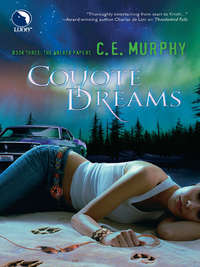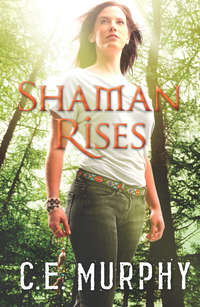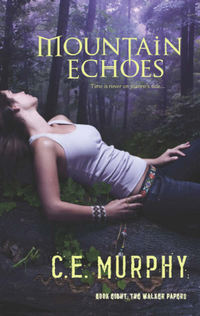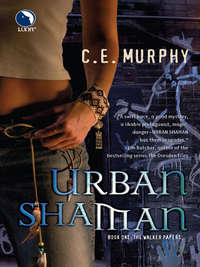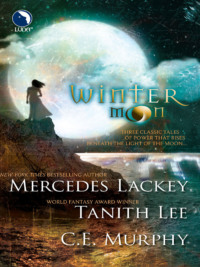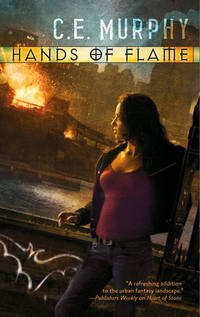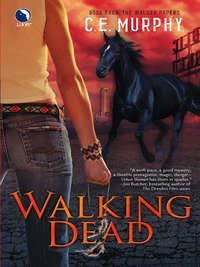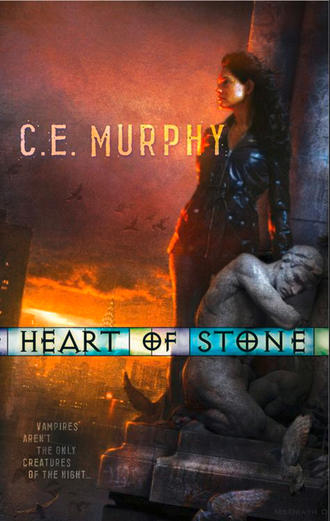
Полная версия
Heart of Stone

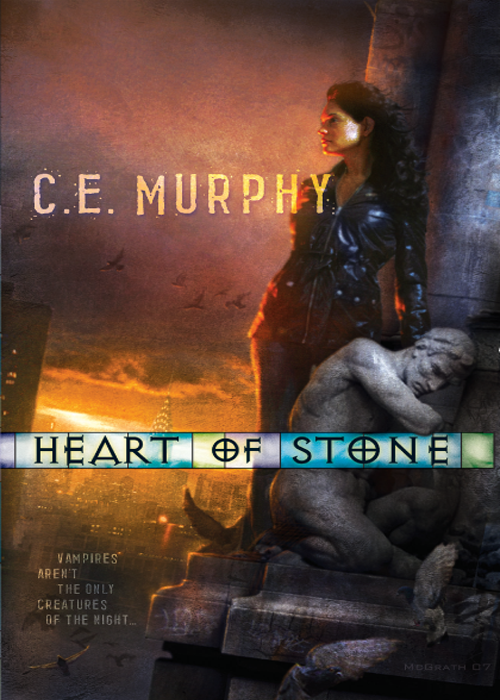
Praise for
C.E. MURPHY
and her books
The Negotiator
Hands of Flame “Fast-paced action and a twisty-turny plot make for a good read…Fans of the series will be sad to leave Margrit’s world behind, at least for the time being.” —RT Book Reviews
House of Cards “Violent confrontations add action on top of tense intrigue in this involving, even thrilling, middle book in a divertingly different contemporary fantasy romance series.” —LOCUS
“The second title in Murphy’s Negotiator series is every bit as interesting and fun as the first. Margrit is a fascinatingly complex heroine who doesn’t shy away from making difficult choices.”
—RT Book Reviews
Heart of Stone “[An] exciting series opener…Margrit makes for a deeply compelling heroine as she struggles to sort out the sudden upheaval in her professional and romantic lives.” —Publishers Weekly
“A fascinating new series…as usual, Murphy delivers interesting worldbuilding and magical systems, believable and sympathetic characters and a compelling story told at a breakneck pace.”
—RT Book Reviews
Author’s Note
Over the past couple of years I’ve had a lot of people comment on my discipline, a mysterious thing that they see as being more self-evident than I do. In most ways, writing is a job like any other: you have deadlines for projects and people get cranky if you don’t turn them in on time. It’s true that if you’re writing without a contract or a publisher (which I was when I wrote the first draft of Heart of Stone), it does take a lot of discipline. It also takes a lot of dreaming, because when you’re writing on spec and hoping for that first sale, the only thing that keeps you going is faith and determination and the willingness to sit down in the chair and apply fingers to keyboard.
This book is the result of more butt-in-chair, fingers-to-keyboard work than I want to think about, and a massive chunk of it was done during an international move. I’m utterly astonished at how that kind of thing focuses the ol’ mind: it’s really easy to be a writer and discover you’ve whiled away your day, effectively creating a situation where you don’t have time to work. (Notice how people with nine-to-five jobs very, very rarely find themselves with a day where they just don’t have time to go to work? I certainly never did.) It would have been extremely easy to not have time to work in the midst of moving across the world. In my case, I have found out I can work through just about anything, if I really have to, and I suppose that’s what people mean when they say they admire my discipline.
Me, I believe pretty much anyone can do the same thing, if they want to. I’d like to think some of that comes through in my stories—not much is actually impossible, if we not only dream, but do. The book you’re holding is the result of both dreaming and doing. I hope you enjoy it!
Catie
HEART OF STONE
C.E. MURPHY

www.mirabooks.co.uk
For my Dad, Thomas Allen Murphy,
who likes this one best so far.
ACKNOWLEDGMENTS
Normally it doesn’t take an army for me to write a book. This one, though, required a rather absurd amount of feedback. To wit:
My agent, Jennifer Jackson, made me do a major rewrite on the manuscript, then said, “This is much better! Now cut another thirty pages from the first hundred and we’ll really have something here!” You were right. Thank you.
My editor, Mary-Theresa Hussey, made me push the book in ways I wouldn’t have on my own, ways that gave the story more depth and richness than I’d ever imagined it to have. Thank you, too. It would be okay if neither of you ever made me work that hard again….
The art department has once more outdone itself, giving me yet another cover I’m thrilled to have my work judged by. Glowing thanks are due to art director Kathleen Oudit and to artist Chris McGrath. You guys help build careers, and I cannot thank you enough.
Dor and Lisa helped me with New York details, so anything I got wrong is either their fault (!) or I made it up wholesale to fit the world.:)
Tara, Mary Anne and Janne gave me feedback on the third draft, by which time I could no longer see the book for the words, so their comments were invaluable. I believe Silkie and Jai, my usual suspects, read every draft without their enthusiasm flagging, and Trent read it at least three times. Their fortitude astounds me. Rob, Deborah, Lisa (again!), Lydia and Morgan listened to me whine interminably about revisions. Rob, in particular, offered some critical brainstorming sessions that did huge amounts to help me develop the mythology of this world; so, too, did Sarah.
Thank you all.
And all I can say to Ted is that I literally could not have written this book without you. I’ll give you a copy with the bits you helped with highlighted, and you’ll see how true that is. Thank you so much, hon. I love you.
ONE
SHE RAN, LONG strides that ate the pavement despite her diminutive height. Her hair, full of corkscrew curls, was pulled back from her face, bunches jouncing as her feet impacted the asphalt surface. The words feminine and female, less interchangeable than they might seem, both described her well. Feminine, as he understood it, suggested a sort of delicacy, though not without strength. Female encompassed power as blunt and raw as sex. Watching her, neither descriptor would suffice without the other.
Lithe and athletic, she ran nearly every night, usually not long after sundown. Tonight she was late; midnight was barely an hour off, closer by far than the late-January sunset. He watched from his arboreal refuge, hunched high above the concrete paths, protective and possessive of the slender woman taking her exercise in a dangerous city.
There were safer places to run, safer times; he thought she must know that. The park was notorious for nighttime crime, but she threw away caution for something greater. For defiance against an ordered world, and perhaps for the thrill of knowing the danger she put herself in. There was confidence in her action, too; her size very likely precluded fighting off attackers, but the muscles that powered her run would help her outpace any enemy that might approach. It was a gambit, and he liked her for it. It reminded him of other women he’d known, sometimes braver than wise, always willing to risk themselves for others. Such demonstrations made him remember there was life outside the confines he’d created for himself.
So he watched from high in the treetops, protecting her whether she knew it or not. Choosing to make her safe despite the independent streak that sent her running after dark, without taking away her illusion of bold solitude. She would never see him, he reasoned. Her people were predators, and they’d come from the trees. In the primitive part of the mind that spoke of caution, they were the danger that came from above.
Humans never looked up.
He shook himself as she took a corner, careening out of sight. Then he leaped gracefully over the treetops, following.
Air burned in her lungs, every breath of cold searing deep and threatening to make her cough with its dryness. Each footfall on the asphalt was the jolt of a syllable through her body: Ir. Ir. Ir. Ra. Shun. Al. There were slick patches on the trail, thin sheets of black ice that didn’t reflect until she was on them. She slid ten inches, keeping her center as if she wore ice skates, stomach tightening to make her core solid. Keeping control in an out-of-control moment. The action stung her body as vividly as a man’s touch might, heat sweeping through her without regard for sense or sensibility. Then the ice was gone and she was running again.
Eyes up, watching the trail and the woods. The air was brisk and as clear as it ever got in New York. Pathways were lit by lamps that buzzed and flickered at whim. Patches of dark were to be wary of, making her heart beat faster with excitement. No headset. Taking risks was one thing. Outright stupidity was another, and even she knew she ran a thin line between the two already. Her own labored breathing and the pounding of her footsteps were enough to drown out more nearby noise than was safe. That was part of it, too, part of the irresistible draw of the park. She was not safe. Nothing she did would ever make her wholly safe.
It was almost like being able to fly.
“Irrational,” Margrit whispered under her breath. The word seemed to give her feet wings like Hermes, sending her down the path with a new surge of speed. Feet jolting against the ground made echoes in her hips and breasts, every impact stinging her feet and reminding her of sex and laughter and the things that made life worth living.
Risking everything made it worth living. Friends, only half joking, wondered if she was suicidal, never quite understanding the adventure that drew Margrit to the park at night.
The Central Park rapist had confessed when she was in her first year of law school and still wondering if she should have chosen to follow in her parents’ footsteps—either her mother’s MBA or her father’s medical degree—but the headlines that morning had solidified her belief in her own decision. Even now, seven years later, she knew her parents wished she’d chosen one of their professions, or at least a more profitable arm of law than the one she pursued, but thinking back to that day always rebuilt her confidence. Buoyed by the memory, she stretched her legs farther and reached again for the feeling of freedom running in the park gave her.
Minutes later, she skidded to a halt under a light and leaned a hip against a battered bench, putting her hands on her knees. Her ponytail flipped upside down, nearly brushing the ground as she heaved in air. Thirty seconds and she would start running again. Twenty-nine. Twenty-eight.
“Good evening.”
Margrit spasmed upward, whipping around to face the speaker. A man with pale hair and lifted eyebrows stood in the puddle of lamplight, several feet away. He was wearing a suit, and had his hands tucked in the pockets of the slacks. “I’m sorry,” he said. “I didn’t mean to frighten you.”
“Jesus Christ.” She backed away a step or two, putting even more distance between herself and the man. Caution knotted her stomach, sending chills of adrenaline through her. “Get the hell away from me.” Every muscle in her body was bunched, ready to sprint, but her heart pounded harder with the thrill of the encounter than with the impulse to run. She wore running shoes, as opposed to his smooth-soled leather slip-ons, and had a head start. Caution hadn’t flared into panic or even true fear yet; her confidence in her own abilities was greater than the evident danger.
That degree of cockiness was going to get her killed someday.
Not today, Margrit whispered to herself, and aloud warned, “I have a gun.”
His eyebrows rose higher. “I don’t.” He took his hands out of his pockets and lifted them slowly, so she could see more of his torso. His shirt was lilac in the lamplight, almost glowing against the jacket lining. There was no gun in evidence. “I was just out for a walk.” He made a small, careful gesture to one side. “I didn’t mean to startle you.”
“Yeah, well, you freaking well did.” Margrit edged back another step or two, balancing her weight on her toes. “This is Central Park, asshole. You don’t start up conversations with people here. Especially in the middle of the night.”
He spread his fingers. “Do you normally carry on conversations with people in Central Park in the middle of the night?”
“No.” The excitement of the moment was passing, and so was the high from running. The sense of fun, if that was the right word for the encounter, faded with it. Margrit took one more step back. “I’m going now. Don’t follow me.” He had at least ten inches of height on her, but she had faith in her own speed. Faith warred with confidence, and both lost out to an unspoken admission of arrogance that almost brought an undermining smile to Margrit’s lips.
“I won’t, but—may I ask you one question?”
“You just did.” Margrit curled her lip in irritation. She hated that particular piece of tomfoolery and resented it coming out of her own mouth. “What?”
“Where are you hiding your gun?” The man looked her up and down, more critically than lasciviously. Margrit glanced down at herself.
Tennies. Socks. Running tights with hot-pink stripes that picked up the blue in the streetlamp and radiated neon purple. A snug white-and-green sweatshirt that covered her midriff only if she didn’t move; otherwise, her belly flashed between hems.
There wasn’t really anywhere for a gun.
Margrit looked up again. “None of your goddamn business.” Her breath puffed in the cool air, reminding her that she was dressed for the late-January weather only if she was running to keep herself warm. She bounced on her toes, muscle tightening in her calves. “Don’t follow me,” she warned again.
“I wouldn’t dream of it,” he murmured.
Margrit raced down the path, putting a dozen yards between herself and the man in a few seconds. When she looked back a moment later, he was gone.
“You’re going to get yourself killed, Margrit.”
Margrit leaned against the open door, doubled over to pull at her laces. Her breath still came in little puffs, and she counted out syllables with each one. Ir. Ra. Shun. Al. The encounter in the park had her repeating the word more often than usual. Irrationally safe. Irrationally foolish. Irrationally defensive.
“Hello, nice to see you, too. My day was fine, thanks, how about yours? What are you doing up this late, anyway? Where’s Cam?” Margrit closed the door and locked it, leaning against the knob with both hands behind her. Her roommate stood down the hall, filling the kitchen door frame. “Cole, I’m fine, really.” She straightened and came down the corridor, brushing past him. His sweater, thick cable knit, touched her arm as she did so, and she added, “Nice sweater,” in hopes of distracting him, before she breathed, “I’m fine,” a final time.
“She went to bed already. 5:00 a.m. client. Thank you,” he added automatically. “Irish wool. Cam gave it to me for Christmas.”
Margrit shuddered. “5:00 a.m. Better her than me. Oh, yeah, I remember. I said I was going to borrow it and she threatened to tie my legs in a knot. It’s a nice sweater. She has good taste.”
“Of course she does. She’s dating me.” Cole offered a brief smile that fell away again as he visibly realized Margrit had succeeded in distracting him. “You’re fine this time, Grit. I’m afraid you’re going to get hurt.” He scowled across the kitchen, more in concern than anger. “You shouldn’t run after dark.”
“I know, but I didn’t get out of work until late.”
“You never do.”
“Cole, what are you, my housemate or my big brother?”
“I’m your friend, and I worry about you when you go out running in Central Park in the middle of the night. You’re going to get yourself killed.”
“Maybe, but not tonight.” The words lifted hairs on her arms, a reminder that she’d thought something similar facing the pale-haired man in the park. She should have heard him, Margrit thought. Even over the sound of her own breathing, she should have heard his approach and departure. Being careless enough to allow someone to sneak up on her was alarming.
But there’d been nothing of the predator in the man, despite his height. Margrit had defended enough criminals to know when she was being sized up as bait. The man in the park had moved with graceful, slow motions, as if aware his very bulk bespoke danger, and he mitigated as best he could with calming actions. As if she might be an easily startled animal—which she supposed she was. The idea brought a brief smile to her lips.
Margrit leaned on the counter and pulled the refrigerator door open. The appliance was an orange behemoth from the fifties, too stubborn to break down, energy inefficient and with a silver handle that could double as a club in a pinch. Margrit was unconscionably fond of it. She grabbed a cup of yogurt and bumped the door closed, turning to lean against it instead of the counter. “I didn’t mean to worry you. I just really needed to go for a run.”
“There’s this crazy new invention, Grit. It’s called a treadmill. They have them at gyms. Gyms that are open twenty-four hours a day, no less. Like the one Cam works at. She keeps offering you a membership.”
“Bah.” Margrit stuck her spoon in her mouth and turned to open the fridge again, looking for more food. “I don’ like thredmillth. Y’don’ go anywhrr.”
“No, but there aren’t random lunatics in the gym, either.”
“Speaking of random lunatics, there was this guy in the park. Said hello to me.” The memory of the man wouldn’t leave her, lingering around the edges of her mind. His light eyes had been colorless in the park lamps, and he’d had a good mouth. Well shaped without being feminine, even pursed that way as he’d looked her over.
God. She had friends she’d known for years whose features she couldn’t remember that clearly. Margrit shook her head, exiting the fridge with a plate of meatloaf in hand, using its mundanity to push away thoughts of the stranger. “You made dinner. I worship you.”
Cole folded his arms over his chest, frowning. “Flattery will get you nowhere. What guy in the park? Dammit, Grit—”
“He was just some guy in a business suit.” He hadn’t looked cold. Despite thirty-degree weather and no winter coat, he’d seemed comfortable. The silk shirt beneath his suit jacket couldn’t have afforded much warmth, but there’d been no shiver of cold flesh when he’d opened his jacket to show he was unarmed. Maybe the jacket had been so well cut as to hide padding, but Margrit doubted it. The breadth of shoulder and chest had looked to be all his own.
“And that what, renders him harmless?”
“I don’t know. He looked like a lawyer or something. Speaking of which.” Margrit cast a look of mock despair across the kitchen, at the same time feeling relief to have work that would take her mind off the blond man.
The kitchen expanded into the dining room, a solidwood, double-door frame making the rooms nominally separate. Legal briefs and somber-colored binders were piled precariously on the dining-room table, over which hung an enameled black birdcage instead of a light fixture. Two desk lamps fought for space on the edges of the table, bordering a laptop-size clearing. “I should get to work. Two hundred grand in student loans won’t go away if I end up unemployed.”
Cole snorted. “I know better, Margrit. You got through school on scholarships and help from your mom and dad.”
Margrit pulled her lips back from her teeth in a false snarl. “You’ve known me too long. Let me tell myself little white lies, Cole. I like to pretend I’m not spoiled rotten. ‘Mom and Dad paid for school’ sounds so snotty. Anyway, I still won’t have a job if I don’t get my work done, and this place needs rent paid on it just like everywhere else.”
“Did it ever occur to you working for somebody who paid better than Legal Aid might help with that?”
“Only every time I talk to Mom, so don’t you start. That’s what they get for sending me to Townsend. Oaths to make the world a better place stick with you. Legal Aid needs all the help they can get. And I’m good at it.”
“You have an overdeveloped sense of responsibility, you know that?” Cole sighed, giving up the argument. “You should cook some kind of vegetable to go with the meatloaf. And go to bed so you can get to work early enough to leave at a decent hour so you’re not running around Central damned Park in the middle of the night.”
“I will,” Margrit promised. “Swear to God. As soon as I’ve finished going over these papers.” She gestured at the dining-room table. “I’ll be in bed by midnight.”
“Margrit, it is midnight.”
Margrit cast a guilty look toward the clock. “It’s only a few minutes after eleven!”
Cole eyed the clock, then Margrit. “You know that going over papers doesn’t mean going into the living room and turning on the TV?”
“Yeah. I’ll be good. You can go to bed.”
Cole drew his chin in and scrutinized her. “Promise?”
“I promise. Scout’s honor.” Margrit held up three fingers.
“Okay. Should I wake you up on my way out?”
“At four-thirty?” Margrit couldn’t keep the horror out of her voice.
Cole shook his head. “I don’t start until seven. Chef Vern’s got a catering event tomorrow night and wants me to do the pastries for it, so somebody else gets to make the doughnuts.”
“No wonder you’re up so late.” Margrit frowned. “When was the last time you made a doughnut, Cole?”
“Christmas,” he said placidly. “You remember. Cam asked me to make them for breakfast.” “I meant for work.”
“Oh. Probably in culinary school. Don’t be difficult. Do you want me to get you up?”
Margrit pulled her hair out of its ponytail and scrubbed her hand through it, fingers catching in springy curls. “Yeah.”
“Okay. Get your work done and go to bed. Night, Grit.” Cole smiled at her and disappeared down the hall.
“Night, Cole,” she called, and waited. When his door clicked shut, she grabbed the plate of meat loaf, a carton of double-swirl chocolate fudge chunk ice cream, a legal brief from the table and a pen from the birdcage, and sauntered into the living room to plunk down on the couch. Soft cushions grabbed her hips, sucking her in with the confidence of an old lover. Margrit spilled her armload onto the cushion next to her and switched on the TV, flipping to the news as she rescued the meat loaf before it stained her paperwork.
She elbowed open her binder and twisted her neck to read it as she ate. The television droned on in the background: a dockworker had drowned and the union was striking; two murder victims had been found in Queens. A note of local interest news was wedged between sound bites of doom and gloom: a 1920s speakeasy, recently discovered hidden behind a collapsed subway tunnel, was being opened to the public on a limited basis. Lest the site opening be considered too cheery, the reporter continued on to solemnly report a Park Avenue suicide. Margrit smiled ruefully at the endless bad news, its dismaying litany unable to deflate the good cheer she felt from her run.
“Irrational creature,” she mumbled, then frowned at the ice-cream carton. “Spoon.” She fought her way out of the couch and brought the meat loaf plate into the kitchen, the binder still in her free hand.
She’d spent enough late nights on the case—a plea for clemency for a woman convicted of murdering a viciously abusive boyfriend—that she could see the annotated pages and carefully printed facts when she closed her eyes. Luka Johnson had served four years of a twenty-year sentence, only allowed to meet with her daughters once a week under highly supervised conditions. The case had been dropped in Margrit’s lap literally weeks out of law school. She’d been Luka’s advocate for the entire length of her incarceration.
Four years. It didn’t seem so long, but Margrit had watched Luka’s youngest daughter grow from a squalling babe in arms to a thoughtful, talkative little girl in that time. The children lived with a foster mother who cared for them very much, but every week that they left Luka behind in prison was a little harder for everyone. The trial judge was sympathetic to their cause; the state coalition against domestic violence had given its support. The governor was expected to hear and make a decision on the clemency within the week. Margrit couldn’t stay away from the paperwork, grooming it for the hundredth time, wondering if she’d missed anything that might cost Luka and her children more years of their shared lives.


